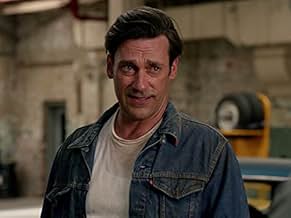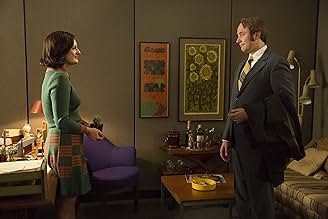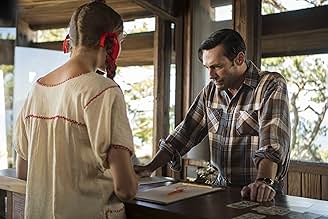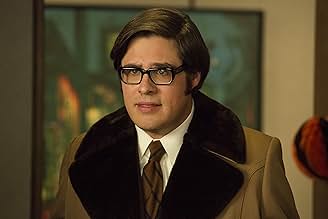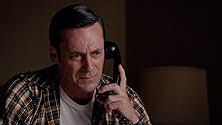Ein Drama über eine der renommiertesten New Yorker Werbeagenturen zu Beginn der 1960er Jahre, mit Schwerpunkt auf dem mysteriösen, aber extrem talentierten Anzeigenmanager der Firma, Donald ... Alles lesenEin Drama über eine der renommiertesten New Yorker Werbeagenturen zu Beginn der 1960er Jahre, mit Schwerpunkt auf dem mysteriösen, aber extrem talentierten Anzeigenmanager der Firma, Donald Draper.Ein Drama über eine der renommiertesten New Yorker Werbeagenturen zu Beginn der 1960er Jahre, mit Schwerpunkt auf dem mysteriösen, aber extrem talentierten Anzeigenmanager der Firma, Donald Draper.
- 16 Primetime Emmys gewonnen
- 166 Gewinne & 450 Nominierungen insgesamt
Folgen durchsuchen
Zusammenfassung
Reviewers say 'Mad Men' is lauded for its deep character studies, historical accuracy, and nuanced depiction of the 1960s, focusing on the advertising industry. The show delves into themes of identity, power, and societal change, with standout performances, especially Jon Hamm as Don Draper. Its meticulous period detail receives high praise. However, some viewers critique the slow pacing, repetitive storylines, and occasional frustration with character exits and unresolved plotlines.
Empfohlene Bewertungen
10Rob1331
Mad Men is one of my favorite shows ever. It was one of the most talked about shows when it was on, it's the reason I started watching it. I wanted to see if the show could live up to all the hype surrounding it and it did. It surpassed my expectations in every way. It actually ended up being one of my favorite shows. The entire cast is brilliant but this is Jon Hamm's show. His character, Don Draper, is iconic. Hamm was so good that he was nominated for an Emmy for all seven seasons the show was on and even won for best male actor. The show itself was also nominated for an Emmy for best drama for all seven seasons and even won a few times. In all the show won 16 Emmys and had over 116 different nominations. I'll say that again in case you thought it was a misprint...Mad Men was nominated for 116 different Emmy awards! That alone should tell you how legendary this show is. I love it so much I plan on watching it all the way through again in the near future.
I'll be the first to admit that Mad Men is a show about watching people go to work and live their lives. It should be dull and uninteresting, yet somehow it managed to grip me for a whole 7 seasons and left me wanting more.
The setting is a big part of it. The historical interest of the time (JFK's assassination, the moon landing, England winning the World Cup, to name a few key points in the show) is enough to keep many gripped. It's more than that though. The characters in themselves are worth following and you get invested in them as the seasons progress.
To be frank I didn't like the first season. I just didn't get the formula and was getting close to giving up on the show. I'm glad I didn't though as it only improves from the second season onward.
The setting is a big part of it. The historical interest of the time (JFK's assassination, the moon landing, England winning the World Cup, to name a few key points in the show) is enough to keep many gripped. It's more than that though. The characters in themselves are worth following and you get invested in them as the seasons progress.
To be frank I didn't like the first season. I just didn't get the formula and was getting close to giving up on the show. I'm glad I didn't though as it only improves from the second season onward.
Mad Men is one of the best-written and most ambitious TV shows in some time. It is worth close study, not just for learning how to create a well-structured show but also how to write one that is truly original and potentially groundbreaking. Story world, or arena, is one of the key structural elements in any TV drama (see the TV Drama Class for how to create this element, as well as the other essential structural elements of a successful show). It is where the story takes place and it usually exists within some specific arena that not only delineates a recognizable unit but also has a set of rules, activities and values that defines the characters. One of the strengths of Mad Men is its story world. Instead of the usual arena of cops, lawyers, or doctors, Mad Men takes us into a Manhattan advertising agency in 1960. Besides being totally unique in TV, this story world is extremely detailed. And the detailing isn't simply a matter of the set design, which is fabulous. It is written into every episode. The writers weave all manner of cultural icons of the late 50s-early 60s, including TV shows, ads, and fashion. This has two great advantages. One is the pleasure of recognition. If you were a kid at that time, as I was, the show is a virtual time machine. And even if you weren't, the authenticity and texture immerse you in the world and make you feel that "You are there!" The other great advantage is that this past world tricks the audience into believing that this is how it really was back then. The first thing we notice when we see all of these details is how much the world has changed. Everybody smoked back then. The men were in charge and the women were all secretaries and housewives. That sets up the kicker. By first thinking how much we've changed, we then realize, with even more impact, all the ways we haven't. This story, set in 1960, is really about today, or more exactly, the ways that human nature only puts on a new skin and the same fundamental challenges of creating a meaningful life must be faced by each of us, every moment of every day. Another structural element that immediately jumps out at you if you want to create a TV show or write for one is the desire line. In Mad Men the desire that structures each episode is fairly nebulous, and that's probably going to cut into the show's popularity (I hope I'm wrong on this one). Desire is the main reason almost all TV shows are set in the cop, lawyer, and doctor arenas. These jobs give their shows a simple and repeatable desire line that tracks the episode every week. Catch the criminal. Win the case. Save the life. But of course this is extremely limiting. Most people don't spend their daily lives solving crimes, prosecuting bad guys, and saving lives. So while the desire line on this show may be more nebulous, it is far closer to what most Americans do in their daily lives. These Mad Men are in the business of selling, which, as Arthur Miller pointed out long ago, is the archetypal American action. But they aren't selling a particular product. They're selling desire, some image of the good life that, because it is a fabricated ideal, is always just out of reach. Writer Matthew Weiner's brilliant conception for this show is to connect the selling of desire to America to the personal and work lives of the ad men themselves. The ad men want the image of the good life in America that they are selling to be true, even if they intellectually make fun of the poor suckers out there who buy it. Main character Don Draper is handsome and talented, with a beautiful wife and two cute little kids. But he has some secrets he's keeping like a mistress in the city and he feels a terrible void he has no idea how to shake. Draper is a master at manipulating desire and creating facades, so when he tries to live the promise for real, the "good life" falls apart in his hands. We are in Far from Heaven and American Beauty territory here. And the second episode even had Draper give his own version of the Existentialist credo of Sartre and Camus that was seeping into pop culture during the late 50s (how's that for a sweet detail on a TV show?). We'll have to see whether Mad Men can extend beyond a few episodes without imploding. Besides the lack of a clean desire line, the subject of hollow suburban existence will make it extremely difficult for the writers to develop the show over the long term without beating a spiritually dead horse. In the meantime, I'm going to sit back and enjoy some great dramatic writing, and nowadays TV is the only place you'll find it.
The brilliance is all in the subtext. There are many hilarious moments that are only funny if you've been paying attention and understand where the character is coming from. There are also many tragic moments that would pass you by if you didn't know what came before. Many lines have double or even triple meanings. Watch this from the beginning, with a friend. Believe me, you will want to discuss each episode afterward to figure out some of the nuances of what happened.
The main Mad Man is the confident womanizer Don Draper, who is head of the Creative department at a mid-sized ad agency in 1960s Madison Avenue. I admit, at first I kind of hated him, but as the viewer learns more about him and his past, I learned to - not love him exactly - but like him and want to watch him endlessly. He is a complicated character who can be a very good man, but also a very bad man.
Don Draper is joined by a rich cast of supporting characters, many of whom deserve a show of their own: The ambitious young Campbell who is utterly sleazy most of the time, but has occasional moments of growth and even cuteness.Peggy Olson starts out as Draper's secretary, but her growth into a strong, confident woman mirrors what is happening for Woman in the 60's. Silver fox Stirling - he may be morally bankrupt but gets some of the best lines. I could go on . . .
The 60's clothes, hairstyles, decor, and current events provide an interesting backdrop for what is essentially a character piece. The setting provides both the occasional laugh (cigarettes being advertised as "healthy") and the more than occasional cringe (how could dumping trash from a picnic in the park right on the grass ever seem okay?!).
If you need fast-paced action or a laugh track, this definitely isn't the show for you. But, if you like character development and subtlety in your television shows, rent the first seasons on DVD and settle in. You won't regret it.
The main Mad Man is the confident womanizer Don Draper, who is head of the Creative department at a mid-sized ad agency in 1960s Madison Avenue. I admit, at first I kind of hated him, but as the viewer learns more about him and his past, I learned to - not love him exactly - but like him and want to watch him endlessly. He is a complicated character who can be a very good man, but also a very bad man.
Don Draper is joined by a rich cast of supporting characters, many of whom deserve a show of their own: The ambitious young Campbell who is utterly sleazy most of the time, but has occasional moments of growth and even cuteness.Peggy Olson starts out as Draper's secretary, but her growth into a strong, confident woman mirrors what is happening for Woman in the 60's. Silver fox Stirling - he may be morally bankrupt but gets some of the best lines. I could go on . . .
The 60's clothes, hairstyles, decor, and current events provide an interesting backdrop for what is essentially a character piece. The setting provides both the occasional laugh (cigarettes being advertised as "healthy") and the more than occasional cringe (how could dumping trash from a picnic in the park right on the grass ever seem okay?!).
If you need fast-paced action or a laugh track, this definitely isn't the show for you. But, if you like character development and subtlety in your television shows, rent the first seasons on DVD and settle in. You won't regret it.
Mad Men was such a terrific show that is absolutely just as good as everyone says it is. I never watched it when it was originally on but after hearing so many great things about it I finally gave it a chance and streamed it. I was blown away but how much I loved it. There's a reason it won so many awards when it was on...because it's terrific! The acting, writing, directing, production, attention to detail, etc are all among the best in television history! I can see why some people may not like it because it does starts off a little slow but give it a few episodes because it absolutely pays off and then you won't want to stop watching it until you binge the entire series!
Wusstest du schon
- WissenswertesAccording to Jon Hamm, the production's pursuit of historical accuracy is such that series researchers will insist on knowing weather conditions, news items, and popular culture for a particular period related to the script's time frame.
- PatzerEpisodes from Season 1 to Season 3 feature rotary phones with clear plastic finger wheels. These episodes take place before 1964, when the plastic wheel was introduced. Before that, the finger wheels were black and metal.
- Zitate
[repeated line]
Don Draper: What do you want me to say?
- VerbindungenEdited into Yoostar 2: In the Movies (2011)
Top-Auswahl
Melde dich zum Bewerten an und greife auf die Watchlist für personalisierte Empfehlungen zu.
Details
- Erscheinungsdatum
- Herkunftsland
- Offizielle Standorte
- Sprache
- Auch bekannt als
- Gã Điên
- Drehorte
- Produktionsfirmen
- Weitere beteiligte Unternehmen bei IMDbPro anzeigen
Zu dieser Seite beitragen
Bearbeitung vorschlagen oder fehlenden Inhalt hinzufügen








